江苏中考英语复习之13个核心语法
初中英语中考语法重点难点知识汇总
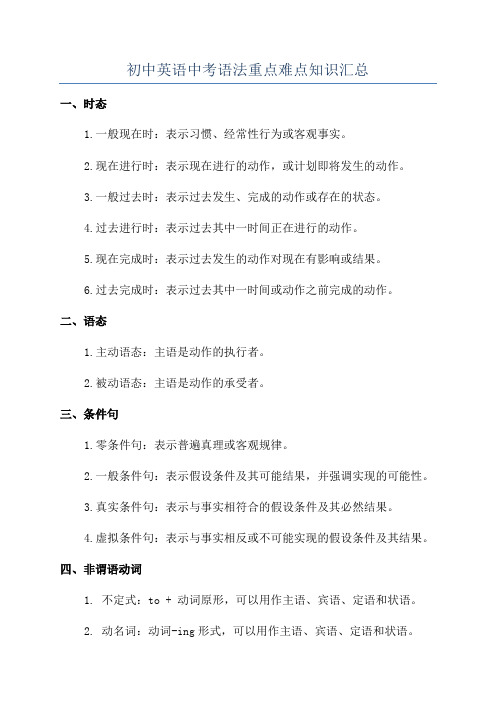
初中英语中考语法重点难点知识汇总一、时态1.一般现在时:表示习惯、经常性行为或客观事实。
2.现在进行时:表示现在进行的动作,或计划即将发生的动作。
3.一般过去时:表示过去发生、完成的动作或存在的状态。
4.过去进行时:表示过去其中一时间正在进行的动作。
5.现在完成时:表示过去发生的动作对现在有影响或结果。
6.过去完成时:表示过去其中一时间或动作之前完成的动作。
二、语态1.主动语态:主语是动作的执行者。
2.被动语态:主语是动作的承受者。
三、条件句1.零条件句:表示普遍真理或客观规律。
2.一般条件句:表示假设条件及其可能结果,并强调实现的可能性。
3.真实条件句:表示与事实相符合的假设条件及其必然结果。
4.虚拟条件句:表示与事实相反或不可能实现的假设条件及其结果。
四、非谓语动词1. 不定式:to + 动词原形,可以用作主语、宾语、定语和状语。
2. 动名词:动词-ing形式,可以用作主语、宾语、定语和状语。
3. 现在分词:动词-ing形式,可作定语、表语等。
4. 过去分词:-ed或不规则变化形式,常用作被动语态和完成时。
五、情态动词1. can/could:表示能力、许可、可能等。
2. may/might:表示允许、请求、可能、推测等。
3. must:表示推测、肯定、必需等。
4. should:表示义务、建议、推测、必要等。
六、名词1.可数名词与不可数名词及其用法。
2.名词所有格的表示方法。
七、代词1.人称代词:主格、宾格、物主代词、反身代词等。
2. 指示代词:this, that, these, those等。
3. 不定代词:some, any, no, every, all, both等。
八、形容词与副词1.形容词的比较级和最高级形式及其用法。
2.副词的比较级和最高级形式及其用法。
九、连词1. 并列连词:and, or, but等。
2. 从属连词:because, when, if, although等。
苏教版初中英语62个必背核心句型

句型1:There+be +主语+地点状语/时间状语There’s a boat in the river.河里有条船。
句型2:What’s wrong with+sb. / sth. ?What’s wrong with your watch?你的手表有什么毛病?句型3:How do you like...?How do you like China?你觉得中国怎么样?句型4:What do you like about...?What do you like about China?你喜欢中国的什么?句型5:had better(not)+动词原形You’d better ask that policeman over there.你最好去问问那边的那个警察。
句型6:How+adj. / adv. +主语+谓语!What a/an+adj. +n. +主语+谓语!How cold it is today !今天多冷啊!What a fine picture it is!多美的一幅图画呀!句型7:Thank+sb. +for (doing) sth.Thank you for coming to see me.感谢你来看我。
句型8:So+be/ 情态动词/ 助动词+主语He is a student. So am I.他是一个学生,我也是。
句型9:... not ... until ...He didn’t have supper until his parents came back.直到他的父母回来他才吃饭。
句型10:比较级+and+比较级The baby cried harder and harder.那孩子哭得越来越厉害。
句型11:the +比较级,the +比较级The more one has,the more one wants.越有越贪。
句型12:... as +adj./ adv.+as ...…not as/so+adj/adv. +as...Do you think that art is as important as music?你认为艺术和音乐一样重要吗?Last Sunday the weather was not so wet as it is today.上个星期天的天气不如今天的天气潮湿。
中考英语13单元语法总结
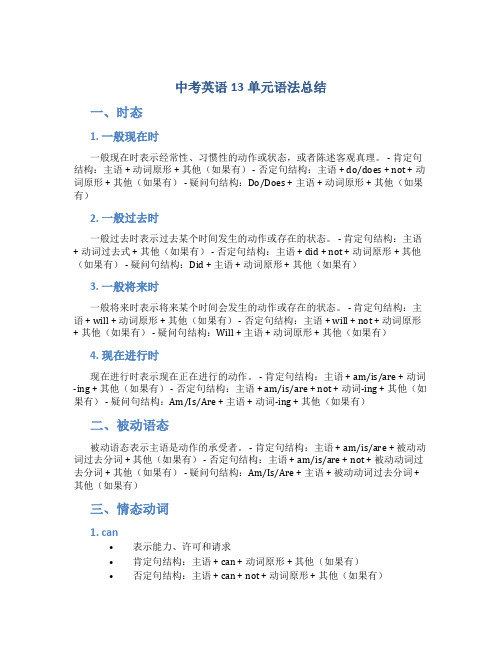
中考英语13单元语法总结一、时态1. 一般现在时一般现在时表示经常性、习惯性的动作或状态,或者陈述客观真理。
- 肯定句结构:主语 + 动词原形 + 其他(如果有) - 否定句结构:主语 + do/does + not + 动词原形 + 其他(如果有) - 疑问句结构:Do/Does + 主语 + 动词原形 + 其他(如果有)2. 一般过去时一般过去时表示过去某个时间发生的动作或存在的状态。
- 肯定句结构:主语+ 动词过去式 + 其他(如果有) - 否定句结构:主语 + did + not + 动词原形 + 其他(如果有) - 疑问句结构:Did + 主语 + 动词原形 + 其他(如果有)3. 一般将来时一般将来时表示将来某个时间会发生的动作或存在的状态。
- 肯定句结构:主语 + will + 动词原形 + 其他(如果有) - 否定句结构:主语 + will + not + 动词原形+ 其他(如果有) - 疑问句结构:Will + 主语 + 动词原形 + 其他(如果有)4. 现在进行时现在进行时表示现在正在进行的动作。
- 肯定句结构:主语 + am/is/are + 动词-ing + 其他(如果有) - 否定句结构:主语 + am/is/are + not + 动词-ing + 其他(如果有) - 疑问句结构:Am/Is/Are + 主语 + 动词-ing + 其他(如果有)二、被动语态被动语态表示主语是动作的承受者。
- 肯定句结构:主语 + am/is/are + 被动动词过去分词 + 其他(如果有) - 否定句结构:主语 + am/is/are + not + 被动动词过去分词 + 其他(如果有) - 疑问句结构:Am/Is/Are + 主语 + 被动动词过去分词 + 其他(如果有)三、情态动词1. can•表示能力、许可和请求•肯定句结构:主语 + can + 动词原形 + 其他(如果有)•否定句结构:主语 + can + not + 动词原形 + 其他(如果有)•疑问句结构:Can + 主语 + 动词原形 + 其他(如果有)2. may•表示允许、请求和可能性•肯定句结构:主语 + may + 动词原形 + 其他(如果有)•否定句结构:主语 + may + not + 动词原形 + 其他(如果有)•疑问句结构:May + 主语 + 动词原形 + 其他(如果有)3. must•表示必须、推测和肯定•肯定句结构:主语 + must + 动词原形 + 其他(如果有)•否定句结构:主语 + must + not + 动词原形 + 其他(如果有)•疑问句结构:Must + 主语 + 动词原形 + 其他(如果有)四、倒装句1. 全部倒装当句子以副词或短语开头时,句子中的主语和谓语动词发生倒装。
初中英语中语法复习-苏教版
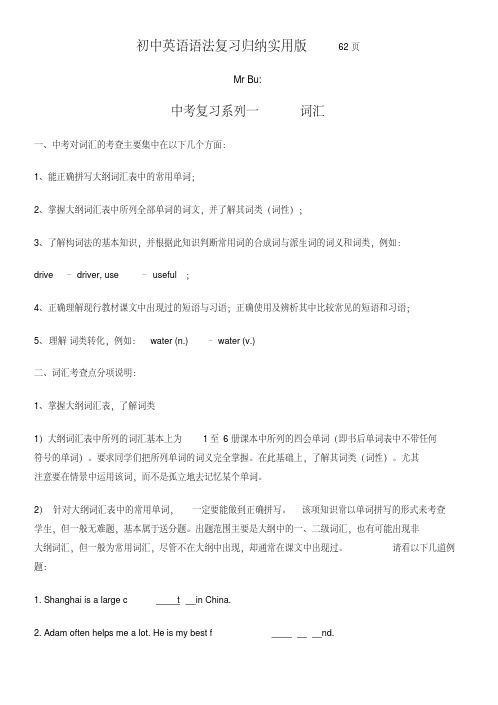
Chinese people are hard-working . 中国人民是勤劳的。
2.合成名词
This is our classroom . 这是我们的教室。
Do you often play basketball
你经常打篮球吗
Her handwriting is much better than mine.
2) 针对大纲词汇表中的常用单词, 一定要能做到正确拼写。 该项知识常以单词拼写的形式来考查
学生,但一般无难题,基本属于送分题。出题范围主要是大纲中的一、二级词汇,也有可能出现非
大纲词汇,但一般为常用词汇,尽管不在大纲中出现,却通常在课文中出现过。
请看以下几道例
题:
1. Shanghai is a large c
hello oh
在上述的十大词类中,名词、代词、形容词、副词、数词、动词等具有明确的意义,可以在句中独 立充当句子成分,称为实义词。 介词、连词和冠词只能起联系或辅助的作用,都不在句子中担任任 何成分,称为虚词。感叹词一般不构成句子的一部分,通常作独立成分。
2、了解构词法的基本知识
在英语中, 一个单词往往与其它词在结构上有联系, 的方法主要有派生、转化和合成等三种。
把这些联系的规律总结出来就是构词法。
构词
1) 派生法
在一个单词前或词尾加上一个词缀, 缀,加在单词后的词缀叫后缀。
从而变成一个新词的方法叫做派生法。
加在单词前的词缀叫前
1.常用前缀
前缀
意义
un-
不
dis-
不,否定
re-
再,重复
mid- 中
in-
不,非
im-
不,非
ir-
初三(九年级)英语语法大全
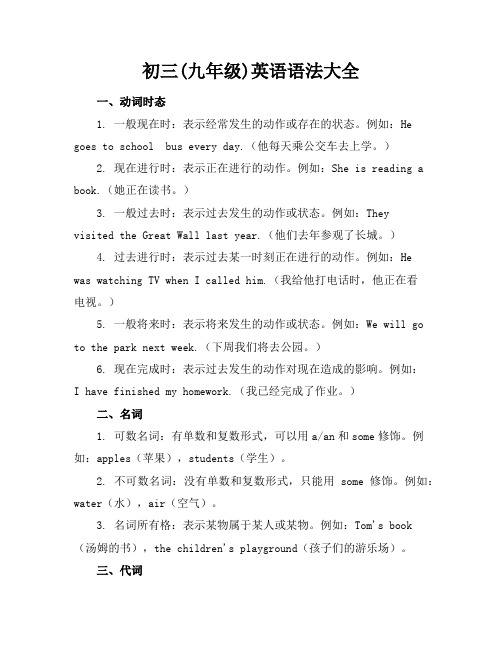
初三(九年级)英语语法大全一、动词时态1. 一般现在时:表示经常发生的动作或存在的状态。
例如:He goes to school bus every day.(他每天乘公交车去上学。
)2. 现在进行时:表示正在进行的动作。
例如:She is reading a book.(她正在读书。
)3. 一般过去时:表示过去发生的动作或状态。
例如:Theyvisited the Great Wall last year.(他们去年参观了长城。
)4. 过去进行时:表示过去某一时刻正在进行的动作。
例如:He was watching TV when I called him.(我给他打电话时,他正在看电视。
)5. 一般将来时:表示将来发生的动作或状态。
例如:We will go to the park next week.(下周我们将去公园。
)6. 现在完成时:表示过去发生的动作对现在造成的影响。
例如:I have finished my homework.(我已经完成了作业。
)二、名词1. 可数名词:有单数和复数形式,可以用a/an和some修饰。
例如:apples(苹果),students(学生)。
2. 不可数名词:没有单数和复数形式,只能用some修饰。
例如:water(水),air(空气)。
3. 名词所有格:表示某物属于某人或某物。
例如:Tom's book(汤姆的书),the children's playground(孩子们的游乐场)。
三、代词1. 人称代词:I(我),you(你/你们),he(他),she(她),it(它),we(我们),they(他们)。
2. 物主代词:my(我的),your(你的/你们的),his(他的),her(她的),its(它的),our(我们的),their(他们的)。
3. 指示代词:this(这个),that(那个),these(这些),those(那些)。
江苏中考英语复习之13个核心语法
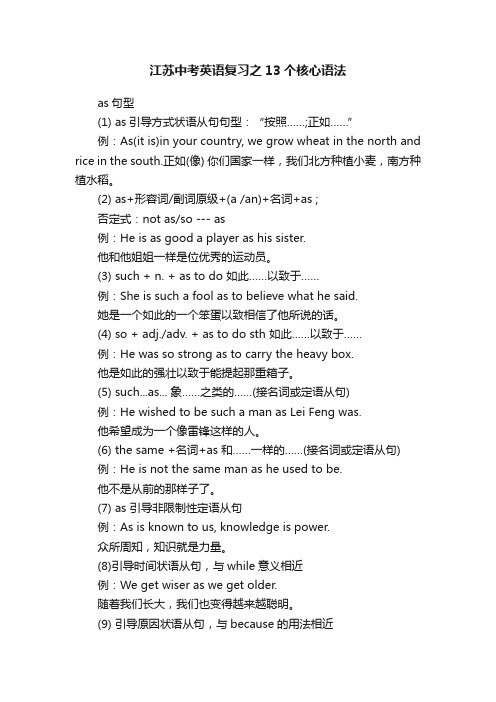
江苏中考英语复习之13个核心语法as句型(1) as引导方式状语从句句型:“按照……;正如……”例:As(it is)in your country, we grow wheat in the north and rice in the south.正如(像) 你们国家一样,我们北方种植小麦,南方种植水稻。
(2) as+形容词/副词原级+(a /an)+名词+as ;否定式:not as/so --- as例:He is as good a player as his sister.他和他姐姐一样是位优秀的运动员。
(3) such + n. + as to do 如此……以致于……例:She is such a fool as to believe what he said.她是一个如此的一个笨蛋以致相信了他所说的话。
(4) so + adj./adv. + as to do sth 如此……以致于……例:He was so strong as to carry the heavy box.他是如此的强壮以致于能提起那重箱子。
(5) such...as... 象……之类的……(接名词或定语从句)例:He wished to be such a man as Lei Feng was.他希望成为一个像雷锋这样的人。
(6) the same +名词+as 和……一样的……(接名词或定语从句)例:He is not the same man as he used to be.他不是从前的那样子了。
(7) as 引导非限制性定语从句例:As is known to us, knowledge is power.众所周知,知识就是力量。
(8)引导时间状语从句,与while意义相近例:We get wiser as we get older.随着我们长大,我们也变得越来越聪明。
(9) 引导原因状语从句,与because的用法相近例:As it was getting very late, we soon turned back.因为越来越迟了,所以我们不久就回来了。
江苏九年级英语知识点归纳

江苏九年级英语知识点归纳江苏九年级英语知识点繁多而杂乱,对于学生来说,整理归纳这些知识点能够更好地理解和掌握。
本文将结合不同主题进行归纳,以帮助学生更好地复习和应对考试。
一、语法知识点1. 时态和语态变化:(1)时态变化:一般现在时、一般过去时、一般将来时等。
(2)语态变化:主动语态、被动语态。
2. 句子结构:(1)简单句:主语+谓语+宾语。
(2)复合句:主从句、并列句等。
3. 从句关系:(1)定语从句:用来修饰名词或代词的从句。
(2)状语从句:用来修饰谓语或其他词组的从句。
(3)宾语从句:作为宾语的从句。
二、词汇知识点1. 同义词和反义词:(1)同义词:意义相同或相近的词语。
(2)反义词:意义相反的词语。
2. 词组和固定搭配:(1)常用短语:take care of, look forward to, as a matter of fact 等。
(2)固定搭配:make a decision, take a chance, have a conversation等。
3. 词义辨析:(1)近义词辨析:like和love, big和large等。
(2)同音词辨析:write和right, their和there等。
三、阅读技巧1. 题型分析:(1)选择题:根据题干和选项找出最正确的答案。
(2)填空题:根据上下文语境填写合适的词语。
2. 理解文章意思:阅读文章时,要注重理解文章的中心思想和作者的观点。
3. 解读生词:遇到生词要通过猜测词义或者查词典等方法尝试理解。
四、听力技巧1. 预测答案:听力题目的选项常常和听到的内容相关,可以根据情景和常识进行预测。
2. 注意关键词:听力材料中的关键词可以帮助理解和答题。
3. 听力策略:针对不同类型的题目,有对应的听力策略,如主旨题、细节题等。
五、写作技巧1. 作文结构:(1)开头:介绍文章主题或提出问题。
(2)主体:展开论述,逐点阐述观点。
(3)结尾:总结观点或提出建议。
江苏九年级英语知识点总结

江苏九年级英语知识点总结一、语法知识点总结1. 时态在英语句子中,时态的使用非常重要。
常见的时态包括一般现在时、一般过去时、一般将来时、现在进行时、过去进行时等。
掌握不同时态的用法能够帮助我们准确地表达事件的发生时间和状态。
2. 名词名词在句子中作为主语、宾语或定语等,起着非常重要的作用。
名词的单复数形式、所有格的表示以及可数和不可数名词的区分等知识点需要掌握清楚。
3. 代词代词用来代替名词,分为人称代词、物主代词、反身代词、指示代词、不定代词等。
了解不同代词的用法,能够使句子更加简洁明了。
4. 形容词和副词形容词和副词用来修饰名词、代词和动词等。
学习它们的比较级和最高级形式,以及在句子中的位置和用法是非常必要的。
5. 介词和介词短语介词用来表示两个词或短语之间的关系,常见的介词包括in、on、at、by、with等。
介词短语在句子中可以作状语、定语或补语等,了解介词的正确用法对于理解和构造句子至关重要。
6. 动词动词是句子的谓语,表示主语的动作、状态或存在。
了解动词的时态、语态、语气、不定式、动名词等形式的用法对于正确运用动词非常关键。
7. 句子结构句子的结构包括主语、谓语、宾语、状语以及定语等,了解不同成分在句子中的位置和作用能够帮助我们更好地理解句子的意思,正确使用句子结构。
二、阅读技巧总结1. 预测在阅读文章之前,可以先快速浏览文章的标题、题目和开头,从中获取一些信息,然后预测关于文章内容的一些问题或答案。
2. 猜测词义遇到不认识的单词时,可以通过上下文猜测词义。
通过文章的语境、词语的前后关系和词根词缀的意义,尽可能推测出单词的含义。
3. 略读和精读略读可以帮助我们快速了解文章的大意,不必深入细节。
而精读则侧重于理解和把握文章的细节、观点和逻辑关系,对于理解整篇文章的意思很有帮助。
4. 划重点在阅读过程中,可以用铅笔或记号笔对重要的词组、句子或段落进行划线,帮助记忆和理解。
5. 多读多练通过多读不同类型的文章,积累词汇和表达方式,提高阅读理解能力。
江苏中考英语复习之初二重点语法汇总

一. 形容词/副词的比较级和最高级1. 形容词/副词的比较级和最高级的构成规则(1)单音节词和少数以-er,-ow结尾的双音节单词,比较级在后面加-er,最高级在后面加-est。
①单音节单词small→smaller→smallestshort→shorter→shortesttall→taller→tallestgreat→greater→greatest②少数以-er,-ow结尾的双音节单词clever→cleverer→cleverestnarrow→narrower→narrowest(2)以不发音e结尾的单音节单词,比较级在原形后加-r,最高级在原级后加-st。
large→larger→largestnice→nicer→nicestable→abler→ablest(3)以一个辅音字母结尾的闭音节(即:辅音+元音+辅音)单词中,先双写末尾的辅音字母,比较级加-er,最高级加-est。
big→bigger→biggesthot→hotter→hottestfat→fatter→fattest(4)以“辅音字母+y”结尾的双音节词,把y改为i,比较级加-er,最高级加-est。
easy→easier→easiestheavy→heavier→heaviestbusy→busier→busiesthappy→happier→happiest(5)其他双音节词和多音节词,比较级在前面加more,最高级在前面加most。
beautiful→more beautiful→most beautifuldifferent→more different→most differenteasily→more easily→most easily(6)有少数形容词、副词的比较级和最高级是不规则的,必须熟记。
good→better→bestwell→better→bestbad→worse→worstill→worse→worstold→older/elder→oldest/eldestmany/much→more→mostlittle→less→leastfar →further/farther→furthest/farthest2. 形容词和副词比较级的用法(1)“甲+be+(倍数)+形容词比较级+than+乙”表示“甲比乙…”或“甲比乙…几倍”。
江苏九年级英语知识点

江苏九年级英语知识点一、单词与短语1. Currency(货币)- 表示货币单位:dollar(美元), pound(英镑), euro(欧元)等。
- 常用表达:currency exchange(货币兑换), currency converter(货币转换器)。
2. Geography(地理)- 表示地理位置:continent(大洲), country(国家), ocean (海洋)等。
- 常用表达:geographical features(地理特征), geography textbook(地理教材)。
3. Environment(环境)- 表示环境问题:pollution(污染), deforestation(森林砍伐), climate change(气候变化)等。
- 常用表达:environmental protection(环保), environmental awareness(环境意识)。
4. Technology(科技)- 表示科技设备:computer(电脑), smartphone(智能手机), tablet(平板电脑)等。
- 常用表达:technological advancements(科技进步), technological innovation(技术创新)。
5. Education(教育)- 表示教育领域:school(学校), teacher(教师), student(学生)等。
- 常用表达:educational system(教育体系), educational policy(教育政策)。
6. Communication(交流)- 表示交流方式:email(电子邮件), social media(社交媒体), video call(视频通话)等。
- 常用表达:effective communication(有效沟通), communication skills(沟通技巧)。
江苏中考英语条重点短语归纳

初中英语110条重点短语归纳1. put down 放下 shut down 把…关上 cut down 砍掉come down下来、落下 slow down 减缓、放慢 sit down 坐下write down 写下 get down 下来,降落2. after all 毕竟.终究 after that 于是.然后 day after day 日复一日地one after another 相继.挨次 soon after 不久以后 the day after tomorrow 后天3. come up with 找到、提出 catch up with 赶上 wake up 弄醒、醒来send up 发射 open up 开设、开办 grow up 长大pick up 拾起、捡起 hands up 举手 eat up 吃光clean up 打扫干净 give up doing sth.=stop doing sth.放弃做某事4. arrive at/in + n. 到达 get to +n.到达 reach + n.到达arrive / get +adv.到达5. get…back 退还, 送回去.取回 give back 归还 come back 回来at the back of 在…的后面 on the way (back)home 在回家路上6. at least 至少 at breakfast 早餐时 at desk 在桌前at once 立刻,马上at school 在上学 at the same time 同时 at work 在工作be good at=do well in 善长 laugh at 嘲笑 not…at all 一点也不at first 起初at night 在晚上 at noon 中午 at the age of was…years old 在…岁时at last / in the end / finally 最后、终于 at the beginning of the twenty-first century在21世纪初at the end of 在…终点、结尾 at the moment /now 现在 at the foot of在…脚下at Christmas 在圣诞节 at any moment 任何时候at times(sometimes)有时, 偶尔at the docto r’s在医务室 be bad at 不善长example 例如 for ever 永远 be good for 对…有益 be bad for对…有害for long=for a long time 长期 for short 简称 be short for 是…的简称TV is short for “television”8. come true 实现 come down 下来 come from=be from 来自, 出生于come in/into 进入,进来 come on 赶快 come over 过来 come along 走吧,过来,快点come and go 来来去去 come up 上来 come out 出来,(花)开,(照片)冲洗出来though=even if 即使、虽然、尽管10. be pleased with 对…感到满意 be covered with 被…覆盖be expected to do sth.被期望做某事 be proud of 以…自豪speak highly of 称赞 be afraid of害怕 hear of听说 (hear from sb.收到某人的来信) of cause=certainly当然可以 plenty of= a lot of许多the way 顺便说 by oneself 单独,独自 by the end of到…为至by the time (引起时间状语从句) 到…的时候 one by one依次by air / plane 乘飞机 by bus / train / car 乘公共汽车/ 火车/轿车(catch a bus赶公交车get on / off the bus上/下车take a bus to…=go to …by bus乘车去)/ try one’s best尽力do one’s homework做家庭作业 do (the/some) shopping 购物do the cooking 烹饪 do some cleaning 打扫do the / some washing洗衣服do sport做运动do with sb / sth.处理well done干得好in the morning 一大早 in the early spring 初春 in my early days我幼年时期early bus 早班车a contribution to 贡献给、捐献 make a telephone call to sb. /ring sb. up/give sb. a call /phone sb. 给某人打电话 connect…to…把…与…连接起来be close to 靠近(某地)give birth to生(孩子) lose to sb输给sb .…or…或者…或者.. on either side of the stree t街道任何一边(on each side of the street 街道每一边 on both sides of the street街道两边)doing sth.不停地做某事 (表示状态继续) keep on doing sth. 坚持做某事(表示动作反复进行) practise doing sth. 练习做某事 enjoy doing sth.喜欢做某事finish doing sth.做完某事 go on doing sth.继续做某事(同一件事)on to do sth.接着做某事(另一事) go straight along 沿着…一直往前走go down下降, go for a walk散, go over复习 go shopping买东西, go to the cinema去看电影go well进展顺利, go off to 动身前往, go out外出, go to work去上班, go up上升,want a go 想试一试18. think about 考虑 (think of 认为、想起、考虑、想到 think over 仔细考虑 think out 想出)talk about 谈论, worry about 担心, How / What about……怎么样…from …从…借…. (lend…to…把…借给…) from door to door 挨家挨, from time to time 时时 from now on 从今以后 from then on 从那以后be different from与…不同 learn…from…向…学习dressed 穿衣 get into进入 get / be lost丢失 get off / on下/上车get on well with sb. 与某人相处得好 get out of从…出来 get ready for +n.为…做准备get ready to do sth.准备做某事 get / go to sleep (fall asleep) 入睡 (be asleep睡着) get warm 变暧 get well康复get a chance 有机会、得到机会21. look for 寻找 wait for 等候 look after=take care of照看 look like看起来像look over 检查,复习 look out 小心,从里向外看 look the same 看起来一样look up 向上看,查单词, look around 环视 look forward to 期望 look through 温习,检查22. set off 出发、动身 put off 推迟 keep off 避开、不靠近… drop off 放下(某物)turn off 关 jump off 跳离, take off 脱(衣) (飞机)起飞23. half a kilo 半千克 half an hour 半小时 in half 分成两半 half of the day 半天24. do eye exercises 做眼保健操 do morning exercises 做早操take (more) exercise (多)参加体育锻炼 an exercise book 练习本25. take part in 参加 hand in 上交 in hospital 住院 in surprise 吃惊地 in the sun 在阳光下 in trouble 处于困境in a minute / moment 马上26. leave for…动身去某地27 feed on 以…为主食 live on 继续活着 base on 以…为根据 carry on 坚持、继续下去and so on 等等 on the other hand 另一方面 on foot 步行28. be famous for 以..著名 be excited about +n./V-ing 对…感到兴奋 be interested in 对…感兴趣be born出生 be busy with sth.— be busy doing sth. 忙于…be amazed at 对..感到惊讶29. move away 移开 move to (搬)移到30. search the Internet上网31. make sure 确信 make a dialogue 编对话 make a mistake 犯错误 by mistake 由于疏忽make a noise 吵闹 make faces 做鬼脸 make friends (with) 和..交朋友 make room for 给..让地方 make tea 沏茶 make money 赚钱 make a decision作出决定to do sth 过去常常做某事 be used to doing sth. 习惯于做某事33. leave sth+介词短语“把……忘记在某处”to do sth. 忘记做某事 encourage sb. to do sth. 鼓励某人做某事decide to do sth.决定做某事 allow sb. to do sth. 允许某人做某事sb. to do (doing)sth. 听见某人做某事sb. (to) do sth .with sth. 帮助某人做某事with one’s help在某人的帮助下 with pleasure 乐意summer holiday(s) 暑假 the winter holiday(s)寒假into 走进 pour into 倒入…the first 第一 for the first time 第一次 at first起初 a firs t language 母语first of all 首先40. leave a message for sb. 给某人留条 give / take sb. a message 给某人捎口信41. take photos / pictures 照像 take away拿走 take out取出 work out 算出take care 当心 take medicine 服药take one’s temperature量体温take one’s time别着急 take a walk 散步 take place 发生42. learn by oneself / teach oneself 自学 learn by heart 背熟43. a year and a half (one and a half years ) 一年半44. have a try 尝试,努力 try out 尝试、试验 find out / about 找出,查明 have a good / wonderful / great / time 玩得开心have a (bad) cold (重)感冒 have a meeting / walk / watch 开会/散步/比赛 have sports 进行体育活动have nothing / sth. to do with 与..无(有)关 have no idea 不知道have (one’s) medicine服药45. offer sb sth. 某人提供某物first prize 获一等奖over the world= around the world =throughout the world 全世界48. all kinds of 各种各样的49. neither… nor 既不…也不….50. not only … but also …不但…而且 , both… and ……和…都51. the more , the better 越多越好52. all one’s life 一生53. as soon as 一…就… as soon as possible 尽可能早地、尽快 as well = too 也as much as 至多 as little as 至少 regard …as 把…当作… as if 好像54. no matter 无论…55 ever since 从那以后,此后一直far 到目前为止 or so大约57. another two hours (=two more hours ) 又(再) 2个小时58. three times a week 一周三次59. the number of …的数量 a (large / good) number of / large numbers of / many 许多than 少于 less and less 越来越少61.…is another way of saying …什么是..的另一说法Quick is another way of saying fast. Bike is short for bicycle.62. not…until…直到…才…like像 feel like +n./V-ing 想要 like best 最喜欢 would like to 想要24 hour clock 24小时制away 冲走 run away逃跑 take away 带走long 不久 long before / ago 很久以前 for long =for a long time 长期no longer = not. .any longer 不再or less = about 或多或少大约more than = over 多于,超过year 每年 every four years 每隔四年 every other day 每隔一天everyday English / life 日常英语/生活69. next to 紧挨着 next door 隔壁,邻居 next year 明年 next time 下次/ get / have a letter from sb. = hear from sb 收到某人的来信show = on display 展览filled with / be full of 充满…73. thank to =because of 由于day =one day (将来)某一天 all day 终日 day and night 日日夜夜in a day or two 一两天内 in the old days 从前,旧社会 from day to day (day after day)日复一日 the day before yesterday 前天 the day after tomorrow 后天 Tree Planting Day植树节Women’s Day 妇女节75. keep / stop / prevent… (from) doing sth. 防止(阻止)…做某事 stop todo sth.停下来去做某事 stop doing sth.停止做某事and +adj. = very +adj.很,非常77. a place (places) of interest 名胜quarters of the information on the Internet 因特网上四分之三的信息 two thirds of the books三分之二的书79. credit card 信用卡80. the increasing population 增长着的人口81 a path of travel 旅行路线82. point at / to 指向83. by sea = by ship 乘船 by the sea = on the sea 在海边 at sea在海上84. set one’s mind to do sth.一心想做某事85 .multiply…by…乘以…86. See you! 再见 You see. 你知道你明白, 你瞧 Let mesee.让我想想see sb. Off 给某人送行 see a / the doctor 看病 see sb .do / doing sth. 看见某人做某事87 some…others 一些(人,物)…其他(人,物) one…another一个..另一个(三者或以上 ) one…the other一个…另一个(总数二个)88. be worn out 穿旧,磨坏 check out 核实,检查 write out 写出take sth. out of 从…拿出/取出某物89. in this way 用这种方法in a few year’s time几年以后 in space 在太空in and out of class 在课内课外 in the last fifteen minutes 在最后十五分钟里in the second half 在下半场later in one’s life在某人后半身in the air 在空中in the open air 在户外sb. an injection 给某人打针 get an injection打针been to 去过某地 have gone to 到某地去了+ be+ 名词+ for+某人 ( Here is a letter for you. 这儿有你的一封信.)far behind +某人 (He is far behind others. 他落后于别人)94. one of + adj.最高级+复数名词95. take +某物+with +某人(You’d better take an umbrella with you.你最好带上雨伞)96. prefer to= like…better than宁愿,更喜欢prefer + V-ing (to do sth.) ( I prefer doing (to do) it myself .我喜欢自己做那件事).Would / should等情态动词 + prefer +不定式. (I would prefer to do it myself.我宁愿自己做那件事) , prefer +名词(v-ing) + to+名词 (v-ing) (I prefer learning English to playing football.我愿意学英语而不愿踢足球) ;prefer +不定式(名词)+ rather than + 不带to的不定式, (I prefer to walk there rather than go by bus.我喜欢走着去那里,而不愿乘车) ,prefer + 名词(代词) to do sth. (We prefer her not to come.我们宁愿她不来)97. 人+ spend +time (money) +(in) doing sth. (I spent over two hours (in)finishing my homework. 我花了两个多小时完成家庭作业.) , 人 + spend + time (money) + on +名词, (He spent 1,000 on the TV set .他花了一千元买电视机). 人+ pay + money +for +sth. ( He p aid ten yuan for the book .他花了10元钱买那本书.) It + takes (will take, / took…) + sb. + time (money) + to do sth. (It’ll take you only ten minutes to get there by bus.乘车去那里只花你10分钟). 物+ cost + (sb.) + money, (The dictionary cost me 20 yuan .我花20元钱买了那本词典) 98. do with + sb. / sth. (What have you done with the pork 那些肉你怎么处理了)99. mind + if 从句, (Do you mind if I open the window我开窗你不反对吧) mind + V-ing, (Would you mind turning on the TV打开电视你不反对吧)100. what…for / why… (What do you learn English for = Why do you learn English) 101. need + 名词 (v-ing), (The students need some help.学生们需要帮助.This pair of shoes needs mending.这双鞋需要修理)102. “be used for+ 名词(v-ing),”被用来做.. (A writing brush is used for writing.) “be used as+名词”, 被作为…使用 (English is used as the first language in none of these countries. ) “be used by+动作执行者”, 被…使用, made of 由…制造 (This table is made of wood .这张课桌是木制的) be made from由…制成 (This kind of paper is made from wood . 这种纸是用木材制成的)be made in+地点, “某地制造”(These cars are made in Germany)be made by+人, “由谁制造的” (This kite is made by Kate . )104. more developed countries 发达国家 less developed countries 不发达国家developing countries 发展中国家worth + money (V-ing), 值…钱.值得做… This car is worth more than two million yuan in China. This book is well worth reading.这本书很值得一读.106. the Summer Palace 颐和园Tian’anmen Square天安门广场 the Palace Museum 故宫the Great Hall of the People 人民大会堂 the Temple of Heaven 天坛the Great Green Wall 绿色长城 PLA 中国人民解放军 PRC 中华人民共和国the Party 中国共产党 the League 共青团 Peking Opera 京剧107 a digital camera 数字照相机 a doctor for animals = an animal doctor 动物医生108. so + 形/副+that 从句 (The place is so cold that nothing can grow in winter.这地方太冷,冬天什么都不长) so + many / few+ 复数名词 +that从句 (He has so many books that I don’t know which one to borrow. 他有那么多书,我不知道借哪一本) so + much / little+ 不可数名词+that从句 (She has so little money that she can’t buy anything .她钱太少,什么也买不到.)so+ 形容词 +a / an +单数名词 +that从句 (This is so good a book that all of us like reading it ) , such +a / an+ 形容词+单数名词+ that从句 (This is such an interesting story that all of us like it) , such +形容词+复数名词+that 从句. such +形容词+不可数名词+that从句 (It is such fine weather today that many children are playing outside)109 .tell sb about sth. 告诉某人关于某事 tell sb+从句 tell sb. to do sth.让某人做某事tell a lie 说谎 tell a story 讲故事 thank you for +n ./V-ing 谢谢你… too +adj. / adv. + to + v.太…而不能 too much (修饰名词)太多,过分much too(修饰adj./adv.)太110. hope / wish+不定式(或从句),wish sb. to do sth. What do you mean by…= What does… mean…是什么意思 (From:。
九年级上册英语江苏知识点
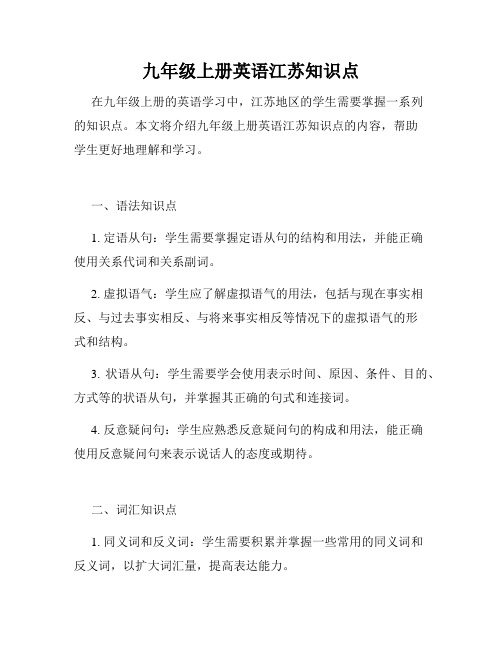
九年级上册英语江苏知识点在九年级上册的英语学习中,江苏地区的学生需要掌握一系列的知识点。
本文将介绍九年级上册英语江苏知识点的内容,帮助学生更好地理解和学习。
一、语法知识点1. 定语从句:学生需要掌握定语从句的结构和用法,并能正确使用关系代词和关系副词。
2. 虚拟语气:学生应了解虚拟语气的用法,包括与现在事实相反、与过去事实相反、与将来事实相反等情况下的虚拟语气的形式和结构。
3. 状语从句:学生需要学会使用表示时间、原因、条件、目的、方式等的状语从句,并掌握其正确的句式和连接词。
4. 反意疑问句:学生应熟悉反意疑问句的构成和用法,能正确使用反意疑问句来表示说话人的态度或期待。
二、词汇知识点1. 同义词和反义词:学生需要积累并掌握一些常用的同义词和反义词,以扩大词汇量,提高表达能力。
2. 词组和固定搭配:学生应熟悉一些常用的固定搭配和常用的短语动词,如“take care of”、“look forward to”等。
3. 同根词和派生词:学生需要了解同一个词根所派生的不同词性和意思,以帮助理解和记忆单词。
三、阅读理解1. 阅读策略:学生需要学会使用一些阅读理解的策略,如猜词义、寻找关键词等,以帮助理解文章的整体内容。
2. 理解细节:学生需要能从文章中获取信息,理解和归纳文章中的关键细节。
3. 推理判断:学生应通过阅读理解文章的内容和语境,进行推理和判断,理解作者的意图和观点。
四、书面表达1. 书信写作:学生需要掌握书信写作的格式和用语,能够写出常见的情景书信,如感谢信、道歉信等。
2. 日记和作文:学生应学会写日记和作文,掌握正确的开头、结尾和段落的连接词,能够表达自己的观点和思想。
五、听力技巧1. 听力材料:学生需要通过学习听力材料来提高自己的听力能力,包括听懂对话和短文等。
2. 笔记技巧:学生应学会边听边记,掌握关键信息和细节,并能够根据听到的内容回答问题。
以上是九年级上册英语江苏知识点的内容概述,通过学习和掌握这些知识点,学生可以提高自己的英语能力,更好地应对考试和日常的学习需要。
苏教版九年级上册英语语法复习要点

九年级上册英语语法复习重点一、时态复习1.一般此刻时观点:常常、频频发生的动作或行为及此刻的某种状况。
时间状语: always, usually, often, sometimes, every week (day, year, month), once a week, on Sundays, etc.基本构造:①be 动词;②行为动词否认形式:① am/is/are+ not; ②此时态的谓语动词若为行为动词,则在其前加don’t,如主语为第三人称单数,则用doesn’t,同时复原行为动词。
一般疑问句:①把be 动词放于句首;②用助动词do 发问,如主语为第三人称单数,则用 does,同时复原行为动词。
2.一般过去时观点:过去某个时间里发生的动作或状态;过去习惯性、常常性的动作、行为。
时间状语:ago, yesterday, the day before yesterday, last week(year, night, month), in 1989, just now, at the age of 5, one day, long long ago, once upon a time, etc.基本构造:①be 动词;②行为动词否认形式:①was/were +not; ②内行为动词前加didn't ,同时复原行为动词。
一般疑问句:①was 或 were 放于句首;②用助动词do 的过去式did 发问,同时复原行为动词。
3.此刻进行时观点:表示现阶段或说话时正在进行的动作及行为。
时间状语: now, at this time, these days, etc.基本构造: am/is/are + doing否认形式: am/is/are + not + doing.一般疑问句:把be 动词放于句首。
4.过去进行时观点:表示过去某段时间或某一时辰正在发生或进行的行为或动作。
时间状语: at this time yesterday, at that time 或以 when 指引的谓语动词是一般过去时的时间状语等。
江苏苏州市初中英语九年级全册Unit 13知识点总结(培优提高)
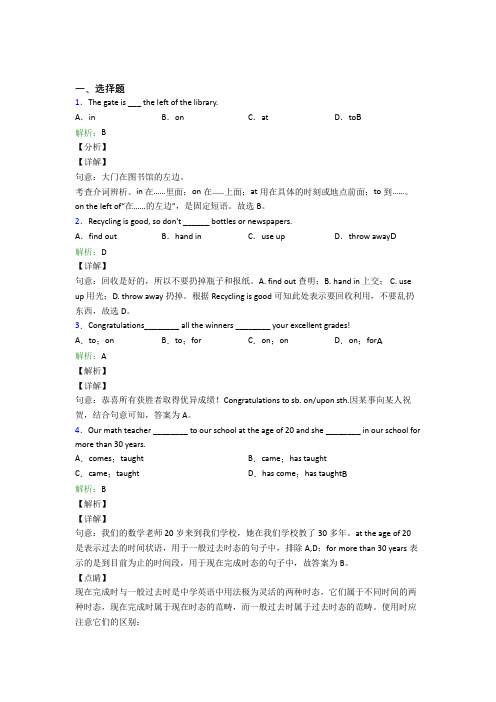
一、选择题1.The gate is ___ the left of the library.A.in B.on C.at D.to B解析:B【分析】【详解】句意:大门在图书馆的左边。
考查介词辨析。
in 在……里面;on在……上面;at用在具体的时刻或地点前面;to到……。
on the left of“在……的左边”,是固定短语。
故选B。
2.Recycling is good, so don't ______ bottles or newspapers.A.find out B.hand in C.use up D.throw away D解析:D【详解】句意:回收是好的,所以不要扔掉瓶子和报纸。
A. find out 查明;B. hand in 上交; C. use up 用光;D. throw away扔掉。
根据Recycling is good可知此处表示要回收利用,不要乱扔东西,故选D。
3.Congratulations________ all the winners ________ your excellent grades!A.to;on B.to;for C.on;on D.on;for A解析:A【解析】【详解】句意:恭喜所有获胜者取得优异成绩!Congratulations to sb. on/upon sth.因某事向某人祝贺,结合句意可知,答案为A。
4.Our math teacher ________ to our school at the age of 20 and she ________ in our school for more than 30 years.A.comes;taught B.came;has taughtC.came;taught D.has come;has taught B解析:B【解析】【详解】句意:我们的数学老师20岁来到我们学校,她在我们学校教了30多年。
初三译林版英语重点语法
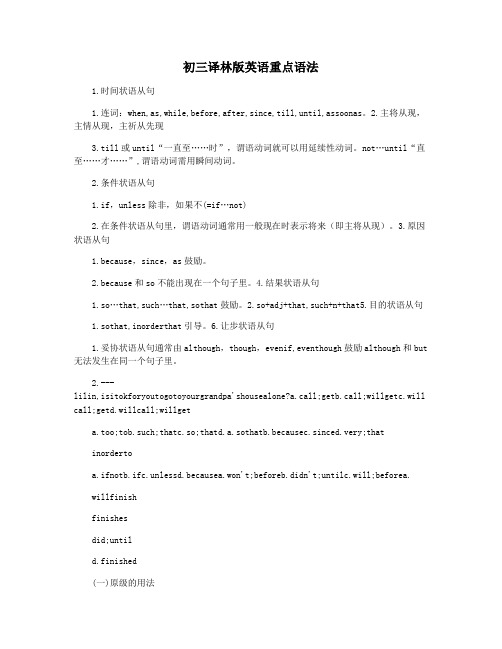
初三译林版英语重点语法1.时间状语从句1.连词:when,as,while,before,after,since,till,until,assoonas。
2.主将从现,主情从现,主祈从先现3.till或until“一直至……时”,谓语动词就可以用延续性动词。
not…until“直至……才……”,谓语动词需用瞬间动词。
2.条件状语从句1.if,unless除非,如果不(=if…not)2.在条件状语从句里,谓语动词通常用一般现在时表示将来(即主将从现)。
3.原因状语从句1.because,since,as鼓励。
2.because和so不能出现在一个句子里。
4.结果状语从句1.so…that,such…that,sothat鼓励。
2.so+adj+that,such+n+that5.目的状语从句1.sothat,inorderthat引导。
6.让步状语从句1.妥协状语从句通常由although,though,evenif,eventhough鼓励although和but 无法发生在同一个句子里。
2.---lilin,isitokforyoutogotoyourgrandpa'shousealone?a.call;getb.call;willgetc.will call;getd.willcall;willgeta.too;tob.such;thatc.so;thatd.a.sothatb.becausec.sinced.very;thatinordertoa.ifnotb.ifc.unlessd.becausea.won't;beforeb.didn't;untilc.will;beforea.willfinishfinishesdid;untild.finished(一)原级的用法1、as+形容词/副词原级+as(与…一样)=thesame….as2、notas/so+形容词/副词原级+as=less+形容词/副词的原级+than(a不如b…)(二)比较级的用法1、than两者(人/物)进行比较比较级+than2、or句式:特殊疑问句,aorb?例如:whoisyouner,lucyorlily?3、润色比较级的词:alot,much,far…得多alittle,abit…一点儿even甚至still仍然4、ofthetwo比较级前要加the用the+比较级+ofthetwo(thetwins/parents)两者中较……的一个。
- 1、下载文档前请自行甄别文档内容的完整性,平台不提供额外的编辑、内容补充、找答案等附加服务。
- 2、"仅部分预览"的文档,不可在线预览部分如存在完整性等问题,可反馈申请退款(可完整预览的文档不适用该条件!)。
- 3、如文档侵犯您的权益,请联系客服反馈,我们会尽快为您处理(人工客服工作时间:9:00-18:30)。
as句型(1) as引导方式状语从句句型:“按照……;正如……”例:As(it is)in your country, we grow wheat in the north and rice in the south.正如(像) 你们国家一样,我们北方种植小麦,南方种植水稻。
(2) as+形容词/副词原级+(a /an)+名词+as ;否定式:not as/so --- as例:He is as good a player as his sister.他和他姐姐一样是位优秀的运动员。
(3) such + n. + as to do 如此……以致于……例:She is such a fool as to believe what he said.她是一个如此的一个笨蛋以致相信了他所说的话。
(4) so + adj./adv. + as to do sth 如此……以致于……例:He was so strong as to carry the heavy box.他是如此的强壮以致于能提起那重箱子。
(5) such...as... 象……之类的……(接名词或定语从句)例:He wished to be such a man as Lei Feng was.他希望成为一个像雷锋这样的人。
(6) the same +名词+as 和……一样的……(接名词或定语从句)例:He is not the same man as he used to be.他不是从前的那样子了。
(7) as 引导非限制性定语从句例:As is known to us, knowledge is power.众所周知,知识就是力量。
(8)引导时间状语从句,与while意义相近例:We get wiser as we get older.随着我们长大,我们也变得越来越聪明。
(9) 引导原因状语从句,与because的用法相近例:As it was getting very late, we soon turned back.因为越来越迟了,所以我们不久就回来了。
(10) 引导让步状语从句例:Child as he is, he knows much about science.尽管他是一个小孩,但他对科学了解得很多。
2prefer句型(1) prefer to do sth例:I prefer to stay at home.我宁愿呆在家里。
(2) prefer doing sth例:I prefer playing in defence.我喜欢打防守。
(3) prefer sb to do sth例:Would you prefer me to stay?你愿意我留下来吗?(4) prefer to do sth rather than do sth ……宁愿…...而不愿...例句:I prefer to stay at home rather than go out.我宁愿呆在家里而不愿出去.(5) prefer doing sth to doing sth例:I prefer watching football to playing it.我喜欢看篮球,不喜欢打篮球。
(6) prefer sth to sth例:I prefer tea to coffee.我要茶不要咖啡。
3when句型(1) be doing sth...when...例:He was still smiling when the door opened and his wife came in.他正笑着的时候门突然开了,他妻子走了进来。
(2) be about to do sth ... when ...例:We were about to start when it began to rain.我们刚要出发,天就开始下雨了。
(3) had just done ... when ...例:I had just gone to bed after a very hard day when the phone rang.在劳累了一天之后我刚刚就寝,电话铃就响了。
4seem句型(1) It +seems + that从句例:It seemed that everyone was satisfied.看来好像每个人都很满意。
(2) It seems to sb that ...例:It seems to me that she is right.我看她是对的,(3) There seems to be ...例:There seems to be a heavy rain.看上去要有一场大雨。
(4) It seems as if ...例:It seemed that she couldn't come to class.看样子她不能来上课了。
5表示“相差…;增加了…”句型(1) She is taller than I by three inches.她比我高三英寸(2) There is one year between us.我们之间相差一岁。
(3) She is three years old than I.她比我大三岁。
(4) They have increased the price by 50%.他们把价格上涨了50%(5) His salary has rised to 10,000 yuan per month.他的工资已经涨到了每月10,000元。
6what句型(1) what 引导主语从句例:What surprised me is that everybody seemed to be very indifferent to her.让我吃惊的是每个人似乎对她都很冷淡。
[ indifferent adj.不关心的;冷漠的](2) what 引导宾语从句例:We can learn what we do not know.我们能学会我们不懂的东西。
(3) what 引导表语从句例:That is what I want.那正是我所要的。
(4) what 引导同位语从句例:I have no idea what they are talking about.我不知道他们正在谈论什么。
7too句型(1) too ... to do ...例:Politics is too important to be left to the politicians.(=Politics is so important that it can't be left to the politicians.)政治太重要了,不能由政治家来决定。
(2) only too ... to do ...例:I shall be only too pleased to get home.我要回到家里就非常高兴。
(3) too + adj + for sth例:These shoes are much too small for me.我穿这双鞋太小了。
(4) too + adj + a + n.例:This is too difficult a text for me.这篇课文对我来说太难了。
(5) can't …too +形容词无论……也不为过例:We cannot emphasize the importance of protecting our eyes too much.我们再怎么强调保护眼睛的重要性也不为过。
8where句型(1) where 引导的定语从句例:This is the house where he lived last year.这就是他去年住过的房子。
(2) where 引导的状语从句例:Where there is a will,there is a way.有志者事竟成。
He left his key where he could find.他将钥匙放在易找到的地方。
I will go where I want to go.我要去我想去的地方。
(3) where 引导的表语从句例:This is where you are wrong.这正是你错的地方。
9wish句型(1) wish that sb did sth 希望某人现在做某事例:I wish I were as strong as you.我希望和你一样强壮。
(2) wish that sb had done sth 希望某人过去做某事例:I wish you had told me earlier要是你早点告诉我就好了。
(3) wish that sb would/could do sth 希望某人将来做某事例:I wish you would succeed this time.我希望你这次会成功。
10would rather句型(1) would rather do sth than do sth 宁愿做……而不愿做……例:She would rather die than turn against his motherland.她宁可死也不去背叛祖国。
(2) would rather have done sth 宁愿过去做过某事例:I would rather have taken his advice.我宁愿过去接受他的意见。
(3) would rather sb had done sth 宁愿某人过去做过某事例:I would rather I had passed the examination last week.我真希望通过上星期的考试。
(4) would rather sb did sth 宁愿某人现在或将来做某事例:Who would you rather went with you?你宁愿谁和你一起去?11before句型(1) before sb can/ could …某人还没来得及……例:Before I could get in a word ,he had measured me.我还没来得及插话,他就给我量好了尺寸。
(2) It will be +时间+ before + 还有多长时间……例:It will be 4 years before he graduates.他还有四年时间变毕业了。
(3) had done some time before (才……)例:We had sailed four days and four nights before we saw land.我们航行了四天四夜才见到陆地。
